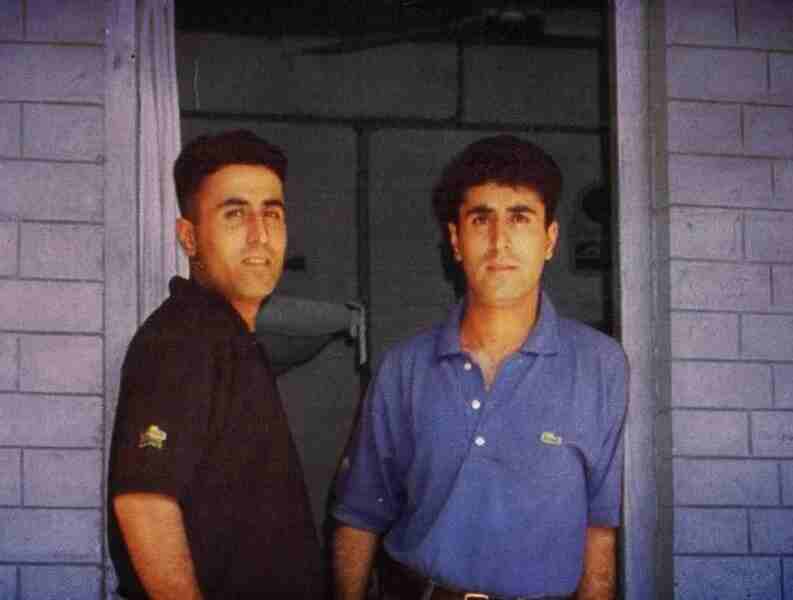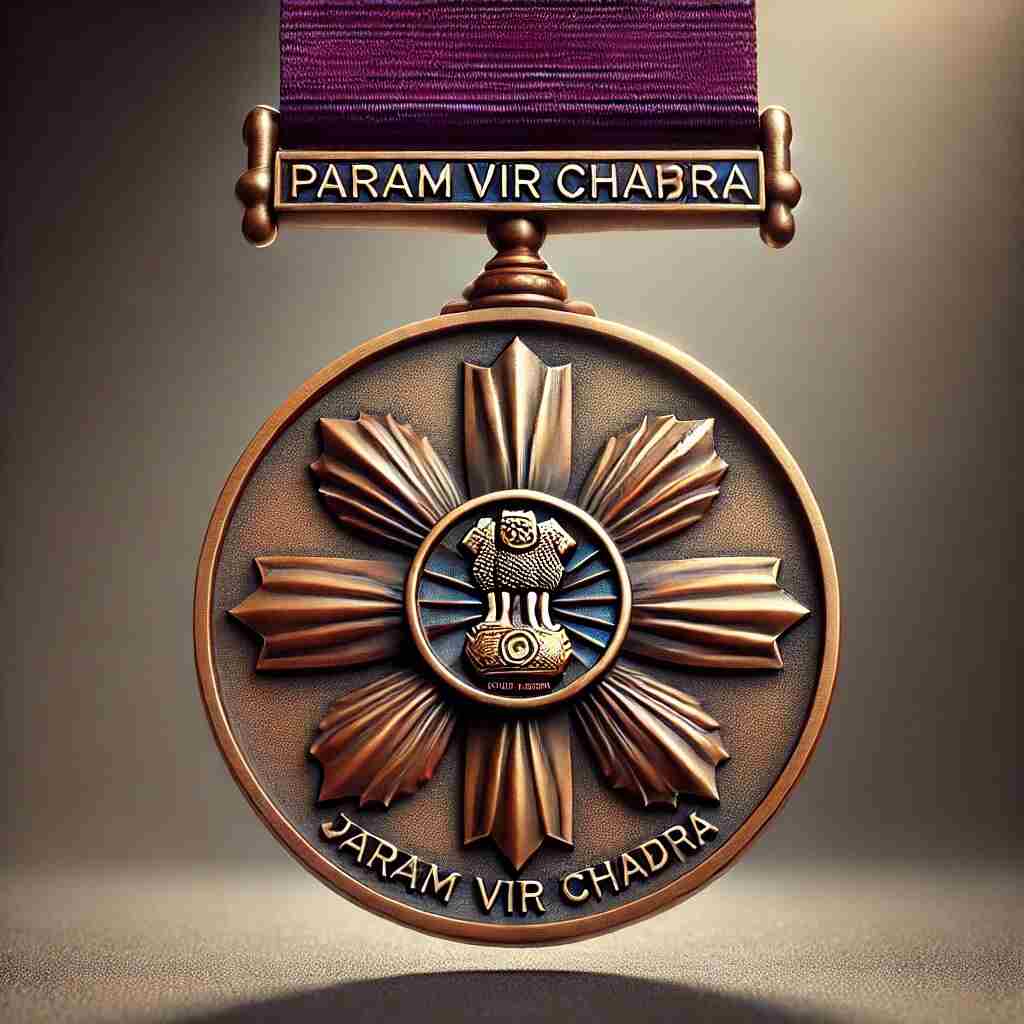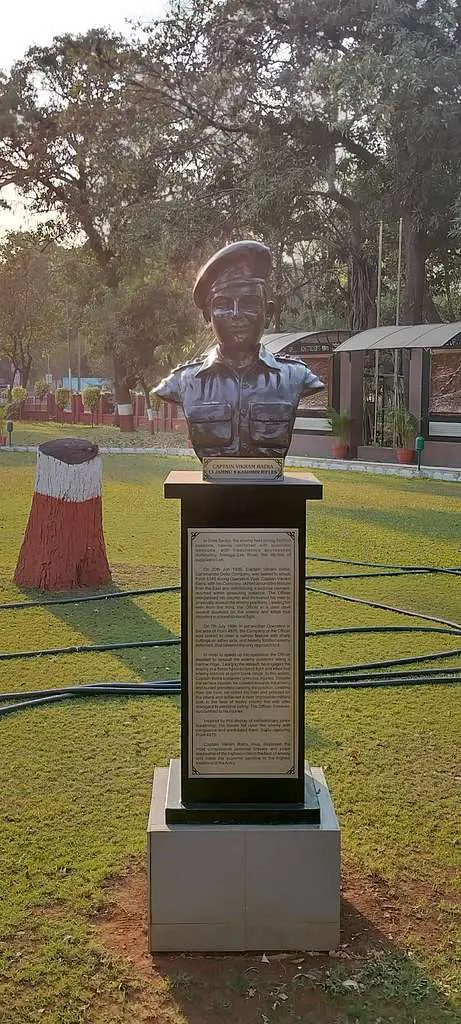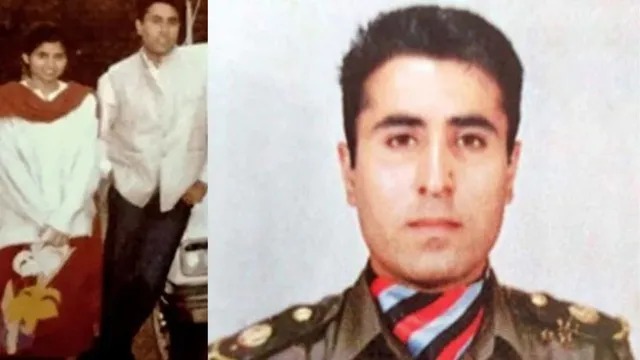Short Information
| Name | Vikram Batra |
| Date Of Birth Place | 9 September 1974 (Palampur, Himachal Pradesh, India) |
| Died Place | 7 July 1999 (aged 24) (Kargil), (Jammu and Kashmir) |
| Allegiance | (India) |
| Service / branch | (Indian Army) |
| Years of service | 1997–1999 |
| Rank | -Captain- |
| Service number | IC-57556H |
| Unit | (13 Rifle Jammu And Kashmi) |
| Battle / war | (Kargil War Battle of Point 5140 Battle of Point 4875) |
| Award | (Param Vir Chakra) |
I’ll either hoist our tricolor in victory and return, or come back wrapped in it – but I will come back. No matter what.” Captain Vikram Batra knew that his words would be true But he didn’t know how, yet Vikram Batra did return – wrapped in his country’s flag. These powerful words, spoken by Captain Vikram Batra, would later become a testament to his unwavering courage and supreme sacrifice during the (1999 Kargil War). Known by his code name “(Sher Shah)” (Lion King), Captain Batra’s story isn’t just a tale of military heroism – it’s a legacy that continues to inspire generations of Indians.
Early Life

Born on September 9, 1974, in Palampur, Himachal Pradesh, Vikram Batra grew up in a middle-class family where values of integrity and service were instilled early. His journey from a bright student at DAV Public School to a decorated military officer reflects the making of a natural leader. At (Government College, Chandigarh), Batra distinguished himself not just academically but also as an (NCC cadet), where he earned the rank of Senior Under Officer.
The transformation from a college student to a military officer began when Batra was selected for the (Indian Military Academy) (IMA). His instructors remember him as a cadet who combined sharp tactical acumen with natural leadership abilities. In 1997, he was commissioned into the 13 JAK Rifles, marking the beginning of what would become a legendary, albeit brief, military career.
Journey of Army

Today’s young generation, at the age of 20-22, often dreams of becoming millionaires and living a life of luxury. But Vikram Batra’s vision was completely different. From childhood, he had one passion, one drive, one dream – to become a soldier and protect his country.
Vikram Batra nurtured this dream for 21 years, then spent a year and a half training at the Indian Military Academy (IMA), and finally, at the age of 23, he turned his dream into reality. He was commissioned as Lieutenant Vikram Batra, and his first posting was in Jammu and Kashmir.
The Kargil Conflict: A War at the Top of the World

The Kargil War of 1999 emerged as one of the most challenging military operations in India’s history. Pakistani forces had infiltrated and occupied key strategic positions on the Indian side of the (Line of Control) (LoC), establishing well-fortified bunkers at altitudes of 16,000 to 18,000 feet.
The theater of war presented extreme challenges:
- Temperatures dropping to -11°C
- Oxygen-depleted air at high altitudes
- Near-vertical cliff faces
- Enemy positions with commanding views of Indian approaches
It was in this harsh battlefield that Captain Batra would write his name into military history through two crucial operations: the capture of Point 5140 and Point 4875.
The Lion King Roars: Point 5140
Point 5140 was a critical mountain peak that gave Pakistani forces a strategic advantage over the Srinagar-Leh highway. Captain Batra’s mission was clear but daunting: capture the peak at any cost. Leading his Delta Company of 13 JAK Rifles, he devised a brilliant strategy of approaching the enemy from the rear.
On June 19, 1999, under the cover of darkness, Batra led his men through treacherous terrain. When his company faced heavy enemy fire, he rallied his troops with the now-famous words: “Don’t worry about casualties, just keep moving forward.” The mission’s success was captured in his victorious radio message: (Yeh Dil Maange More) (This heart wants more) – words that would become synonymous with his indomitable spirit.
The Final Battle: Point 4875

Fresh from the success at Point 5140, Captain Batra volunteered to lead another crucial mission to recapture Point 4875. This peak, later named Batra Top in his honor, was strategically vital for the Indian Army’s advance.
During the intense battle, Batra displayed extraordinary courage. When one of his fellow officers was hit, he rushed to rescue him, exposing himself to enemy fire. In the words of a fellow soldier: “He was like a guardian angel to us, always putting his men’s safety before his own.”
On July 7, 1999, while successfully neutralizing enemy positions and leading his men forward, Captain Batra was hit by enemy fire. His last words were reportedly: “(Jai Mata Di)” (Victory to Mother Goddess), as he continued to inspire his men even in his final moments.
Legacy of the Lion King
Captain Vikram Batra was posthumously awarded the
“Param Vir Chakra“

India’s highest military decoration. His sacrifice and leadership played a crucial role in India’s victory in the Kargil War. The success of Operation Vijay owes much to officers like him who led from the front.
His impact extends beyond military achievements:
- Multiple institutions and roads across India bear his name
- His story inspired the 2021 film

“Shershaah“ movie link
- The Indian Army’s training programs use his tactical decisions as case studies
- Annual memorial lectures keep his legacy alive for future generations The Man Behind the Legend
Those who knew Captain Batra speak of his multifaceted personality. His twin brother, Vishal Batra, recalls: “Vikram wasn’t just a soldier; he was a devoted son, a caring brother, and someone who lived life with passion and purpose.”
His leadership style combined professional excellence with deep compassion for his troops. Fellow officers remember how he would share his rations with his men and often take the most dangerous positions himself. This blend of tactical brilliance and human touch made him an exceptional leader.
A Lasting Impact

Captain Vikram Batra’s story represents the finest traditions of the Indian Armed Forces. His famous quote,
“Yeh Dil Maange More,”
transformed from an advertising slogan into a battle cry that embodies the spirit of India’s military courage.
The Kargil War memorial in Drass, where his name is inscribed in golden letters, stands as a testament to his sacrifice. But perhaps his greatest memorial is the continuing inspiration he provides to young Indians who aspire to serve their nation.
In an era where true heroes are rare, Captain Vikram Batra’s life reminds us that courage, leadership, and sacrifice are timeless virtues. His story teaches us that some flames burn so brightly that even after they’re gone, they continue to light the way for others.
This post honors Captain Vikram Batra, PVC (9 September 1974 – 7 July 1999), and all the brave soldiers who made the ultimate sacrifice during the Kargil War.
Truth Love Story Vikram Batra

In the picturesque town of Palampur, nestled amidst the lush green mountains of Himachal Pradesh, Captain Vikram Batra and (Dimple Cheema) love story blossomed like the vibrant flowers that dotted the landscape. They met during their college days at Government College, Chandigarh, where their friendship soon turned into a deep and passionate romance.
Vikram, with his charming smile and infectious enthusiasm, won Dimple’s heart with his dreams of serving the nation. They shared dreams, laughter, and countless moments under the starlit sky, making promises of a future together. Dimple admired Vikram’s passion for life and his unwavering determination to become a soldier, while Vikram found in Dimple a pillar of support and love that inspired him every day.
As Vikram embarked on his journey to the Indian Military Academy (IMA), their bond only grew stronger. They exchanged letters filled with love and encouragement, each word a testament to their unwavering commitment to one another. Dimple would often say, “No matter where you go, my heart will always be with you.” And Vikram would reply with a smile, “I will come back to you, no matter what.”
But as fate would have it, the Kargil War of 1999 changed everything. Vikram was called to the front lines, and the couple’s plans for a future together began to hang by a thread. They had spoken of getting married after his return, of starting a life together, but the reality of war loomed over them like a dark cloud.
During the war, Vikram’s bravery shone brightly. He fought valiantly, leading his troops with courage and determination. But every moment spent away from Dimple weighed heavy on his heart. He often thought of her, picturing her smile and remembering their dreams. He had promised her that he would return, and that promise drove him to push through the harshest of conditions.
On July 7, 1999, as the bullets flew and the air was thick with tension, Vikram fought bravely to recapture Point 4875. His last moments were filled with the echo of Dimple’s voice in his mind. He fought with the same passion he had poured into their love, believing that he would return to her side. But fate had other plans.
When news of Vikram’s death reached Dimple, her world shattered. The dreams they had woven together lay in tatters, and the future they had envisioned was cruelly snatched away. Heartbroken yet proud, Dimple honored Vikram’s memory, knowing that he had given his life for a cause greater than themselves.
In the years that followed, Dimple carried Vikram’s spirit within her. She often visited his memorial, where flowers bloomed as a symbol of their love—a love that transcended life and death. She became an advocate for the families of martyrs, sharing Vikram’s story and inspiring others with his courage and sacrifice.
Though their love story was left incomplete, it became an eternal flame, lighting the path for others to follow. Dimple often whispered to the wind, “Vikram, my love, I will always cherish our memories. You may be gone, but you will never be forgotten.” And in her heart, Vikram lived on, a hero who fought not just for his country but for a love that would forever remain unmatched.
While Captain Batra made the ultimate sacrifice for his nation, his eternal love story lives on through Dimple Cheema, who transformed her loss into a profound testament of devotion. For over two decades, she has honored their love by dedicating herself to teaching, choosing to remain unwed, and keeping their shared dreams alive. Their story transcends the ordinary bounds of romance – it speaks of a love so pure that it continues to touch hearts and inspire generations. In Dimple’s quiet dignity and unwavering fidelity, we witness how true love doesn’t end with separation; it evolves into something timeless and sacred.
More Information: war heros

